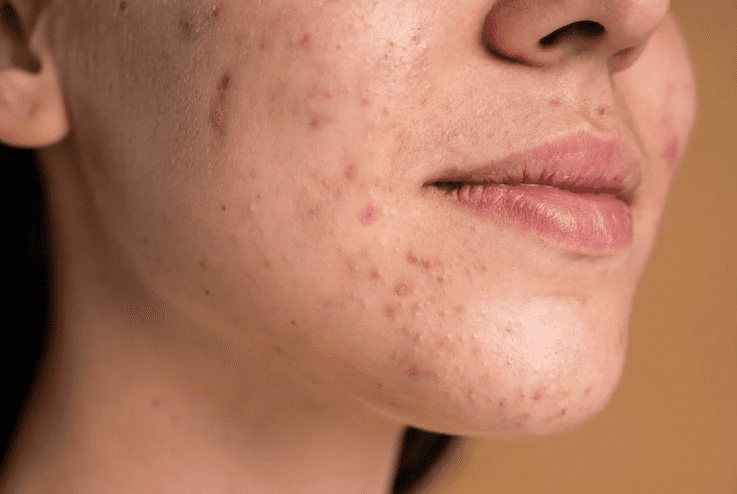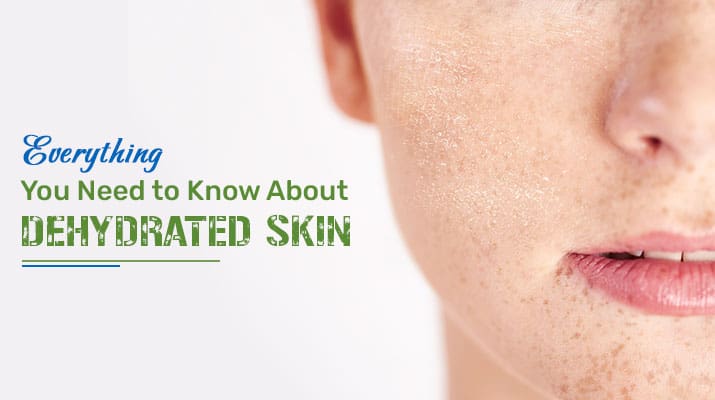Skin Dehydration
Dehydration occurs when your skin lacks water, which can make it look dull, flaky and even cause fine lines and wrinkles. While it’s essential to stay hydrated by drinking plenty of water, sometimes our skin needs a little extra TLC to maintain its natural moisture balance.
In this blog, we’ll explore the best skin products and advice from skin care specialists and dermatologists on how to keep your skin looking and feeling healthy. Whether you’re struggling with dry, itchy skin or just looking for ways to maintain a healthy glow, this post is for you.
What Causes Skin Dehydration?
There are a wide range of factors that go into your skin’s health and plenty of ways that can cause your skin to become dehydrated. Let’s look at just a few:
1. Environmental Factors
The harsh elements of nature, such as cold weather, wind, smoke, UV rays, and pollution, can take a toll on your skin. Exposure to these environmental stressors can cause the skin to lose moisture, leading to dehydration.
2. External Factors
Habits like smoking and excessive alcohol consumption can also contribute to dehydrated skin. These substances can deplete the skin’s natural oils and moisture, leading to dryness and flakiness.
3. Fatigue or Stress
Chronic stress and fatigue can cause hormonal imbalances that lead to skin dehydration. When the body is under stress, it produces cortisol, which can decrease the skin’s natural oils and cause dryness.
4. Excessive Cosmetics
Overusing cosmetics or harsh products can strip the skin of its natural oils and cause dehydration. It’s vital to choose products that are gentle on the skin and avoid over-exfoliating or using too many products at once.
5. Aging
As we age, our skin’s natural moisture barrier weakens, and it becomes more prone to dehydration. This can cause fine lines and wrinkles, as well as an overall loss of elasticity.
Signs of Lack of Skin Hydration
Now that we’ve explored some of the factors that contribute to skin dehydration, let’s examine some of the most prevalent signs and symptoms of skin dehydration you’ll want to watch for:
1. Dry Skin
One of the most obvious signs of skin dehydration is dry, flaky skin. When your skin lacks water, it may feel rough, scaly, and even itchy or irritated.
2. Dullness
Dehydrated skin can also appear dull and lackluster. When the skin is well-hydrated, it looks plump and radiant. But when it’s thirsty, it can seem tired and lack vitality.
3. Dark Circles and Wrinkles
Skin dehydration can also lead to dark circles under the eyes and fine lines and wrinkles on the face. When the skin is dehydrated, it can lose its elasticity, making it more prone to wrinkles and sagging.
4. Itching
Dehydrated skin can be itchy and uncomfortable, especially if it’s accompanied by dryness and flakiness. This can be particularly problematic for those with sensitive skin.
5. Dry Eyes, Lips, and Mouth
Skin dehydration doesn’t just affect the face – it can also cause dryness in other areas of the body, including the eyes, lips, and mouth. If you’re experiencing dry, cracked lips or dry, itchy eyes, it could be a sign of skin dehydration.

Other Side Effects of Skin Dehydration
In addition to signs and symptoms that may indicate your skin might need water, skin dehydration can cause a number of other effects, such as:
1. Breakouts or Acne
When the skin is dehydrated, it can produce more oil to compensate for the lack of moisture, clogging pores, and leading to breakouts or acne.
2. Redness
Dehydrated skin can also appear red and inflamed. This is because the skin’s natural moisture barrier is compromised, making it more susceptible to irritation and inflammation.
3. Inflammation
Inflammation is another potential side effect of skin dehydration. When the skin is dehydrated, it can become more vulnerable to environmental stressors, such as UV rays and pollution, which can trigger an inflammatory response.
4. Congestion
Dehydrated skin can also lead to congestion or a buildup of dead skin cells and debris on the skin’s surface. This can cause the skin to appear dull and can also contribute to breakouts and acne.
5. Increased Skin Sensitivity
Finally, dehydrated skin can make the skin more sensitive and reactive. This can make tolerating certain skincare products or environmental factors more complicated, such as extreme temperatures or harsh chemicals.
If you’re experiencing any of these side effects, it’s important to address the underlying cause of your dehydrated skin. Speak with a skin care professional or dermatologist to define your needs and develop a comprehensive treatment plan.
How to Get Rid of Skin Dehydration
So, what can you do to improve your skin’s hydration? Let’s break it down and examine some great ways to improve your hydration and overall skin health:
1. Minimize Caffeine Intake
Caffeine is a diuretic, which means it can cause the body to lose water. To prevent dehydration, limiting your intake of caffeinated beverages, such as coffee and tea, is crucial.
2. Stop Smoking
Smoking can also contribute to skin dehydration. Nicotine constricts blood vessels, reducing blood flow and oxygen to the skin, causing the skin to appear dull and dry.
3. Drink Plenty of Water
Drinking enough water is crucial for keeping the skin hydrated. Aim to drink at least eight glasses of water daily to ensure your body and skin stay hydrated.
4. Get Plenty of Sleep
Sleep is essential for healthy skin, allowing the body to repair and regenerate. Lack of sleep can lead to dehydrated skin and other skin issues like dark circles and puffiness.
5. Eat Healthy
Eating a diet rich in fruits, vegetables, and other nutrient-dense foods can also help keep the skin hydrated. These foods are high in vitamins and minerals that support healthy skin function.
6. Develop a Nightly Skincare Routine
Establishing a nightly skincare routine is key to preventing and treating dehydrated skin. Look for dehydrated skin products that are formulated to hydrate and nourish the skin, such as a gentle cleanser, a hydrating serum, and moisturizers.
If you’re struggling with dehydrated skin, it’s a good idea to consult with a skincare specialist or dermatologist. They can provide personalized recommendations for dehydrated skin treatment for your specific needs. With a little effort and the proper skin care treatment, you can achieve healthy, hydrated skin that looks and feels great.
Ready to Reclaim Your Skin Health? Call Winston Salem Dermatology!
Winston Salem Dermatology is proud to offer a wide selection of cosmetic and medical skin care treatments tailored to your unique needs and skin care goals. Whether you want to improve your skin’s hydration or address a specific skin condition, we have the experience to deliver real results.
So, don’t let dehydration hold you back from enjoying the health your skin deserves. Contact Winston Salem Dermatology today at (336) 774-8636 and let our skin care specialists help you develop a treatment plan for you!

